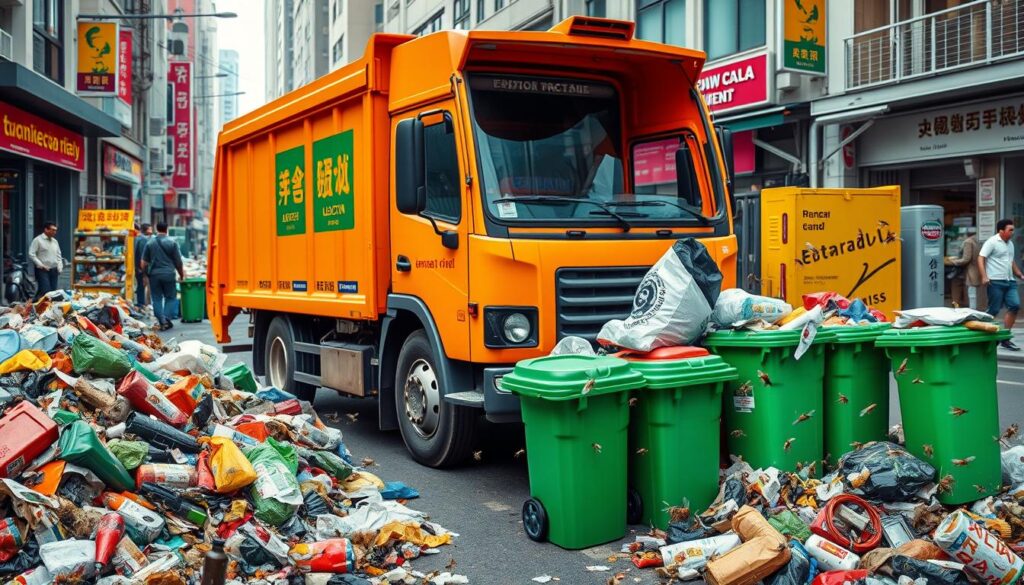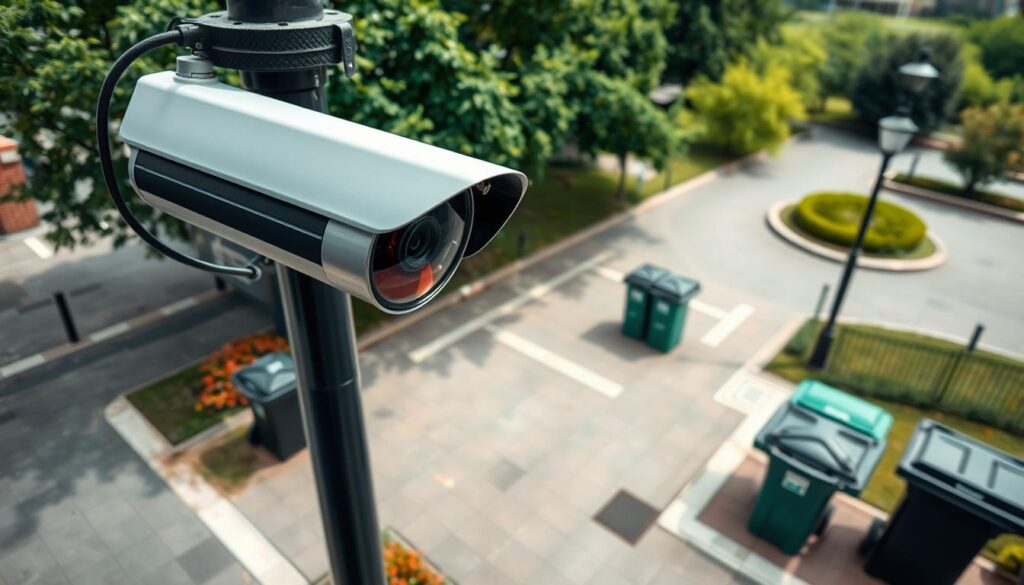Do you get annoyed by rubbish piles in your area? Wonder how more waste collection could help fight fly-tipping? In the UK, you deserve a clean place to live. But, it takes work from both local authorities and us.
Fly-tipping is a big problem in the UK. It ruins our environment, attracts pests, and is bad for our health. It also costs a lot to clean up. Knowing why it happens and how to stop it is key. This article will show how more waste collection frequency, municipal waste management, and garbage pickup schedules can help. We’ll also talk about better solid waste collection routes and trash removal cycles.
Key Takeaways
- Fly-tipping is a big problem for UK communities.
- More refuse collection frequency and sanitation service intervals can help fight flies.
- Good residential waste pickup calendars and curbside collection timetables help us recycle more.
- Working together with local authorities is key for better dumpster emptying frequency and waste solutions.
- Planning and putting waste collection strategies into action can make our communities cleaner and better.
Understanding the Impact of Fly-Tipping
Fly-tipping is when people dump waste illegally. It harms the environment and local areas. It also hurts wildlife and their homes.
Environmental Consequences of Illegal Dumping
Waste dumped illegally can destroy habitats. This makes it hard for plants and animals to live. Animals might get sick or die from eating or getting stuck in trash.
It also makes the air and water dirty. This is bad for people’s health too.
Economic Burden on Local Councils and Businesses
Local councils spend a lot of money cleaning up. They also spend on finding who did it and stopping it. This costs taxpayers a lot.
Waste dumped illegally can also make houses and shops less valuable. It scares away customers. This hurts local businesses a lot.
We need to fight fly-tipping in many ways. We must understand how it harms the environment, health, and economy. Working together, we can make our communities cleaner and safer.
Waste Collection Frequency and Its Role in Preventing Fly Problems
Regular waste collection services help keep public spaces clean. This stops waste from building up. It also makes it harder for people to dump waste illegally.
Having easy ways to throw away waste helps everyone. It stops people from dumping waste elsewhere. This makes our community cleaner and safer.
URS bins can hold up to 5m3 of waste. This means waste is collected less often. It also means fewer vehicles on the road, which is better for the planet.
URS bins are designed to keep waste clean. They make it easier to sort waste properly. This helps local recycling and reduces waste problems.
Using electric vehicles with URS bins is a good idea. It saves money and is better for the environment. It also makes waste collection more efficient.
URS software helps plan waste collection. It makes sure valuable recycling is collected at the right time. This saves money and helps the environment.
URS bins are also safer. They reduce the risk of fires and service disruptions. This keeps waste collection running smoothly, even in bad weather.
“The APSE & Liverpool City Council URS Framework enables public bodies to access various URS components, including the units themselves, installation and maintenance, vehicles for emptying, and related technology like fill level sensors and routing software.”
For more info on URS, email the APSE Solutions Team at [email protected].

Legal Framework and Penalties for Fly-Tipping
The UK has strong laws against fly-tipping. The Environmental Protection Act 1990 makes it a crime. Local authorities and the Environment Agency can catch and punish offenders.
Those caught can face big fines or jail. Fines can be up to £50,000 or 12 months in jail. For serious cases, fines can be unlimited and jail time up to 5 years.
The Clean Neighbourhoods and Environment Act 2005 gives councils more power. They can now give fines for small dumping. These laws show the UK’s serious fight against fly-tipping.
Overview of UK Laws Against Illegal Waste Disposal
The Environmental Protection Act 1990 makes sure land is clean. It also lets people take action if land is dirty.
The Clean Neighbourhoods and Environment Act 2005 gives councils more power. They can now tackle litter, dog mess, fly-tipping, and graffiti.
Discussion of Fines and Punishments for Offenders
People caught fly-tipping face big penalties. The Environmental Protection Act 1990 can fine up to £50,000 or jail for 12 months. For serious cases, fines can be unlimited and jail up to 5 years.
The Clean Neighbourhoods and Environment Act 2005 lets councils fine for small dumping. This is another way to stop fly-tipping.
Community Engagement and Awareness Campaigns
Getting the local community involved is key in fighting fly-tipping. It makes people feel they own and care for their area. Community clean-up events, neighbourhood watch programs, and waste management education workshops help. They teach people to report fly-tipping incidents.
This teamwork makes it harder for fly-tippers to hide. It stops them from dumping waste illegally.
Local councils have done great work in this area. For example, Three Rivers District Council got England’s top recycling rate at 64.1% by 2019/20. They worked hard on teaching people about waste and getting them involved.
Derry City and Strabane District Council also did well. They found out using circular economy ideas could save £3.1 million a year. This shows how community efforts can save money and protect the environment.
“By actively involving the community, local authorities can create a collective sense of responsibility and make it more challenging for fly-tippers to operate undetected.”
Initiatives like Bristol City Council’s “Slim My Waste, Feed My Face” campaign cut down food waste. Groups like Stop Incineration North East and Wyre Forest Friends of the Earth also got people to stop bad waste projects. They show how community action can lead to good changes.
By making people part of waste management, councils can make communities better. Together, we can fight fly-tipping and make our areas cleaner and greener.
Effective Prevention Strategies for Fly-Tipping
Stopping fly-tipping needs a big plan. The key is to stop it before it starts. Local groups and councils can make places less welcoming to illegal dumping.
Increased Surveillance and Physical Barriers
Putting up CCTV cameras in fly-tipping spots can scare people off. These cameras catch illegal dumping and help catch the culprits. Gates or fences in danger spots also keep unwanted visitors away.
Regular Waste Collection Schedules
Having waste picked up often stops fly-tipping. It keeps public areas clean and free from waste. Keeping to a waste collection plan helps keep places tidy and discourages dumping.
| Measure | Potential Benefits |
|---|---|
| Surveillance systems |
|
| Physical barriers |
|
| Regular waste collection |
|
Using these strategies together helps fight fly-tipping. It makes it harder for people to dump waste illegally.

Collaborating with Local Businesses for Waste Management Solutions
Dealing with fly-tipping needs teamwork. Working with local businesses is a good idea. It helps both sides. Local authorities can offer waste disposal options that are easy and cheap. This can stop illegal dumping and make the community feel more responsible.
Businesses can help with waste management by joining in. This fight against fly-tipping helps them too. In the UK, finding affordable waste disposal options has gotten better. This makes it easier for businesses to manage their waste well.
In some UK places, commercial recycling efforts are doing great. This shows how good local business partnerships can be. Recycling can save money, from thousands to tens of thousands of pounds a year.
| Waste Material | Recycled Products |
|---|---|
| Paper | Newsprint, tissues, packaging |
| Plastics | Bottles, containers, clothing |
| Metals | Cans, automotive parts, construction materials |
| Electronics | New electronic devices, building materials |
| Textiles | Insulation, cleaning rags, new clothing |
To get businesses to help with waste management collaboration, we need a clear plan. This plan should include separate bins for different types of waste. Having the right bins in the right places helps everyone recycle more.
By working together with local business partnerships, we can make waste management better. This will help reduce fly-tipping in our communities.
Conclusion
Fly-tipping is a big problem that needs a new way to solve it. We must look at the harm it causes to our environment, economy, and society. By finding the root causes, we can make our communities cleaner.
Increasing waste collection and making laws stronger are good starts. Working with the community and local businesses is also key. Together, we can make our places cleaner and healthier.
We need a plan that protects our environment and involves everyone. This way, we can stop fly-tipping and make our future better. Our communities will be cleaner and greener for everyone.
